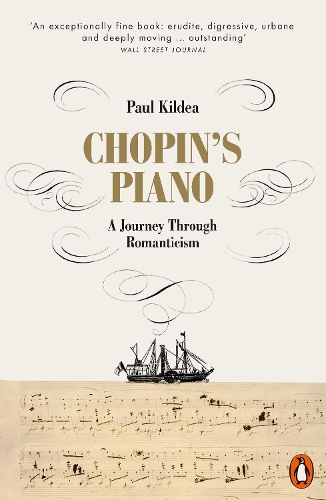
Chopin's Piano: A Journey through Romanticism
(Paperback)
Publishing Details
Chopin's Piano: A Journey through Romanticism
By (Author) Paul Kildea
Penguin Books Ltd
Penguin Books Ltd
6th August 2019
1st August 2019
United Kingdom
Classifications
General
Non Fiction
Art music, orchestral and formal music
Composers and songwriters
786.2092
Physical Properties
Paperback
368
Width 130mm, Height 198mm, Spine 21mm
272g
Description
A dazzling exploration of Romantic music unlike any other, from one of the most exciting writers about classical music Chopin's Piano begins in November 1838, when George Sand, her children and Frederick Chopin took a boat to Majorca for the winter. It describes their circumstances there, and how Chopin completed one of the most revolutionary works in the history of music - his Preludes - on 'a small Mallorquin piano' which he picked up when they arrived and carted up to the monastery in the mountains where he and Sand lodged. Kildea traces the history of the Preludes, their pianists, their interpretations, and the history of the Mallorquin piano itself, to find an unexpected path through the history of romantic music - via Wanda Landowska in Berlin in 1913, Paris in 1940-41 when the Nazis seized the piano, down to the end of romantic music. It is an astonishing narrative and detective story, an unclassifiable and thrilling book, which explores in an original way the changing meaning of music through time.
Reviews
A wonderful book about music, musicians, cultural similarities and differences, the blood and gore of revolutionary times and the compensations of high art. Kildea writes with elegance and wit, and displays the kind of scholarship that does not come from simply mugging up on a few books. ... A book that will, amongst other things, send the reader back with fresh ears to the delightful, tormented Pole, and hear the music he composed on a borrowed piano in a monastery cell in Mallorca one terrible winter -- Michael Henderson * The Times *
Chopin's Piano takes the motif of this piano - "Out of date before it was completed"; its maker Juan Bauza unknown and possibly an amateur - and uses it to tie together various narrative strands in an original, constantly interesting format. As it does it tells the story of Chopin's work, the development of piano making, and how music became inextricably linked to atrocities in the 20th century. -- Jonathan McAloon * Financial Times *
An episodic, picaresque tale, woven confidently - at times even pacily - by Kildea. He writes knowledgeably and approachably about music and sympathetically about his cast of characters. It is the story of an obsession, but it manages not to feel obsessional. ... I enjoyed it very much. -- Alan Rusbridger * Spectator *
Author Bio
Paul Kildea holds an honours degree in piano performance and a masters degree in musicology from The University of Melbourne - where he is now an Honorary Principal Fellow and where in 2016 he was Miegunyah Distinguished Visiting Fellow - and a doctorate from Oxford University. His books include Selling Britten and Britten on Music. In January 2013 Penguin published Benjamin Britten- A Life in the Twentieth Century to enormous critical acclaim; it is now widely recognized as the best book on its subject, the Financial Times calling it 'unquestionably the music book of the year.' In June 2018 Penguin published Chopin's Piano- A Journey Through Romanticism, which is currently being developed as a feature film. In October 2019 he succeeded Carl Vine as Artistic Director of Musica Viva, Australia.
